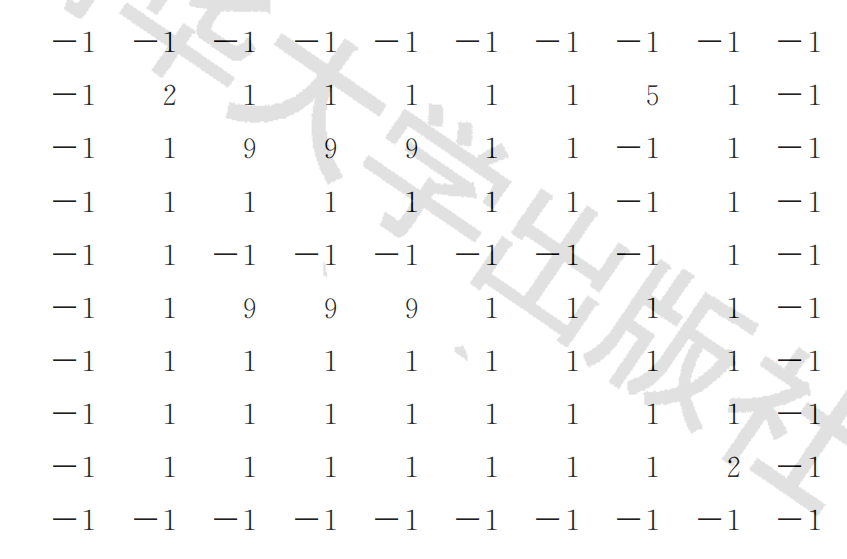7-44 迷宫变种-最短路径
发布时间:2024年01月21日
下面图示表示一个迷宫,四周为-1表示围墙,内部为-1表示障碍,权 值1、2、5、9表示经过需要消耗的能量代价。请找出从入口(3,6)到出口(8,8),老鼠消耗能量最小的路径(注意本题是四个方向的迷宫)

输入格式:
第一行:迷宫的大小m n ,分别表示迷宫的长和高
第二行:入口和出口
其余行:迷宫的矩阵表示
提示:用65535为无穷大
输出格式:
输出为老鼠消耗能量最小的路径,以逆序输出
输入样例:
在这里给出一组输入。例如:
10 10
3 6 8 8
-1 -1 -1 -1 -1 -1 -1 -1 -1 -1
-1 2 1 1 1 1 1 5 1 -1
-1 1 9 9 9 1 1 -1 1 -1
-1 1 1 1 1 1 1 -1 1 -1
-1 1 -1 -1 -1 -1 -1 -1 1 -1
-1 1 9 9 9 1 1 1 1 -1
-1 1 1 1 1 1 1 1 1 -1
-1 1 1 1 1 1 1 1 1 -1
-1 1 1 1 1 1 1 1 2 -1
-1 -1 -1 -1 -1 -1 -1 -1 -1 -1
输出样例:
在这里给出相应的输出。例如:
(8 8)(7 8)(6 8)(5 8)(4 8)(3 8)(2 8)(1 8)(1 7)(1 6)(2 6)(3 6)?
#include <stdio.h>
#include <stdbool.h>
#include <stdlib.h>
#include <limits.h>
#define MAX_MAZE_SIZE 10
#define INF 65535
typedef struct {
int x, y;
int cost;
} Node;
typedef struct {
Node data[MAX_MAZE_SIZE * MAX_MAZE_SIZE];
int size;
} PriorityQueue;
int maze[MAX_MAZE_SIZE][MAX_MAZE_SIZE];
int m, n;
int entryX, entryY, exitX, exitY;
int energy[MAX_MAZE_SIZE][MAX_MAZE_SIZE];
int dx[4] = { -1, 0, 1, 0 };
int dy[4] = { 0, 1, 0, -1 };
PriorityQueue* createPriorityQueue() {
PriorityQueue* pq = (PriorityQueue*)malloc(sizeof(PriorityQueue));
pq->size = 0;
return pq;
}
void enqueue(PriorityQueue* pq, Node node) {
pq->data[pq->size++] = node;
int i = pq->size - 1;
while (i > 0 && pq->data[i].cost < pq->data[(i - 1) / 2].cost) {
Node temp = pq->data[i];
pq->data[i] = pq->data[(i - 1) / 2];
pq->data[(i - 1) / 2] = temp;
i = (i - 1) / 2;
}
}
Node dequeue(PriorityQueue* pq) {
Node minNode = pq->data[0];
pq->data[0] = pq->data[pq->size - 1];
pq->size--;
int i = 0;
while (2 * i + 1 < pq->size) {
int leftChild = 2 * i + 1;
int rightChild = 2 * i + 2;
int minChild = leftChild;
if (rightChild < pq->size && pq->data[rightChild].cost < pq->data[leftChild].cost)
minChild = rightChild;
if (pq->data[i].cost <= pq->data[minChild].cost)
break;
Node temp = pq->data[i];
pq->data[i] = pq->data[minChild];
pq->data[minChild] = temp;
i = minChild;
}
return minNode;
}
bool isValid(int x, int y) {
return x >= 0 && x < m && y >= 0 && y < n && maze[x][y] != -1;
}
int min(int a, int b) {
return a < b ? a : b;
}
void aStar() {
for (int i = 0; i < m; i++) {
for (int j = 0; j < n; j++) {
energy[i][j] = INF;
}
}
PriorityQueue* pq = createPriorityQueue();
Node start = { entryX, entryY, 0 };
enqueue(pq, start);
energy[entryX][entryY] = 0;
while (pq->size > 0) {
Node current = dequeue(pq);
if (current.x == exitX && current.y == exitY) {
return;
}
for (int i = 0; i < 4; i++) {
int newX = current.x + dx[i];
int newY = current.y + dy[i];
if (isValid(newX, newY)) {
int newCost = current.cost + maze[newX][newY];
int minCost = min(energy[newX][newY], newCost);
if (minCost < energy[newX][newY]) {
energy[newX][newY] = minCost;
Node neighbor = { newX, newY, minCost };
enqueue(pq, neighbor);
}
}
}
}
}
int main() {
// Read input
scanf("%d %d", &m, &n);
scanf("%d %d %d %d", &entryX, &entryY, &exitX, &exitY);
for (int i = 0; i < m; i++) {
for (int j = 0; j < n; j++) {
scanf("%d", &maze[i][j]);
}
}
// Run A* algorithm
aStar();
// Print path
printf("(%d %d)", exitX, exitY);
int x = exitX;
int y = exitY;
while (x != entryX || y != entryY) {
for (int i = 0; i < 4; i++) {
int newX = x + dx[i];
int newY = y + dy[i];
if (isValid(newX, newY) && energy[x][y] - maze[x][y] == energy[newX][newY]) {
printf("(%d %d)", newX, newY);
x = newX;
y = newY;
break;
}
}
}
return 0;
}
?
文章来源:https://blog.csdn.net/2402_82561397/article/details/135705524
本文来自互联网用户投稿,该文观点仅代表作者本人,不代表本站立场。本站仅提供信息存储空间服务,不拥有所有权,不承担相关法律责任。 如若内容造成侵权/违法违规/事实不符,请联系我的编程经验分享网邮箱:chenni525@qq.com进行投诉反馈,一经查实,立即删除!
本文来自互联网用户投稿,该文观点仅代表作者本人,不代表本站立场。本站仅提供信息存储空间服务,不拥有所有权,不承担相关法律责任。 如若内容造成侵权/违法违规/事实不符,请联系我的编程经验分享网邮箱:chenni525@qq.com进行投诉反馈,一经查实,立即删除!
最新文章
- Python教程
- 深入理解 MySQL 中的 HAVING 关键字和聚合函数
- Qt之QChar编码(1)
- MyBatis入门基础篇
- 用Python脚本实现FFmpeg批量转换
- css常见面试题
- python统计分析——多变量描述统计
- Python列表详解
- 单目测距(yolo-目标检测+标定+测距代码)
- navicat密码解密
- 支持向量机(SVM):高效分类的强大工具
- 【AI视频领域展望】未来视频行业:人工智能、5G和VR技术将如何改变视频制作和观看方式?
- Mr. Cappuccino的第66杯咖啡——解决MacOS中终端下的中文乱码问题
- Plantuml之组件图语法介绍(二十二)
- C++ 设计模式之 中介者模式